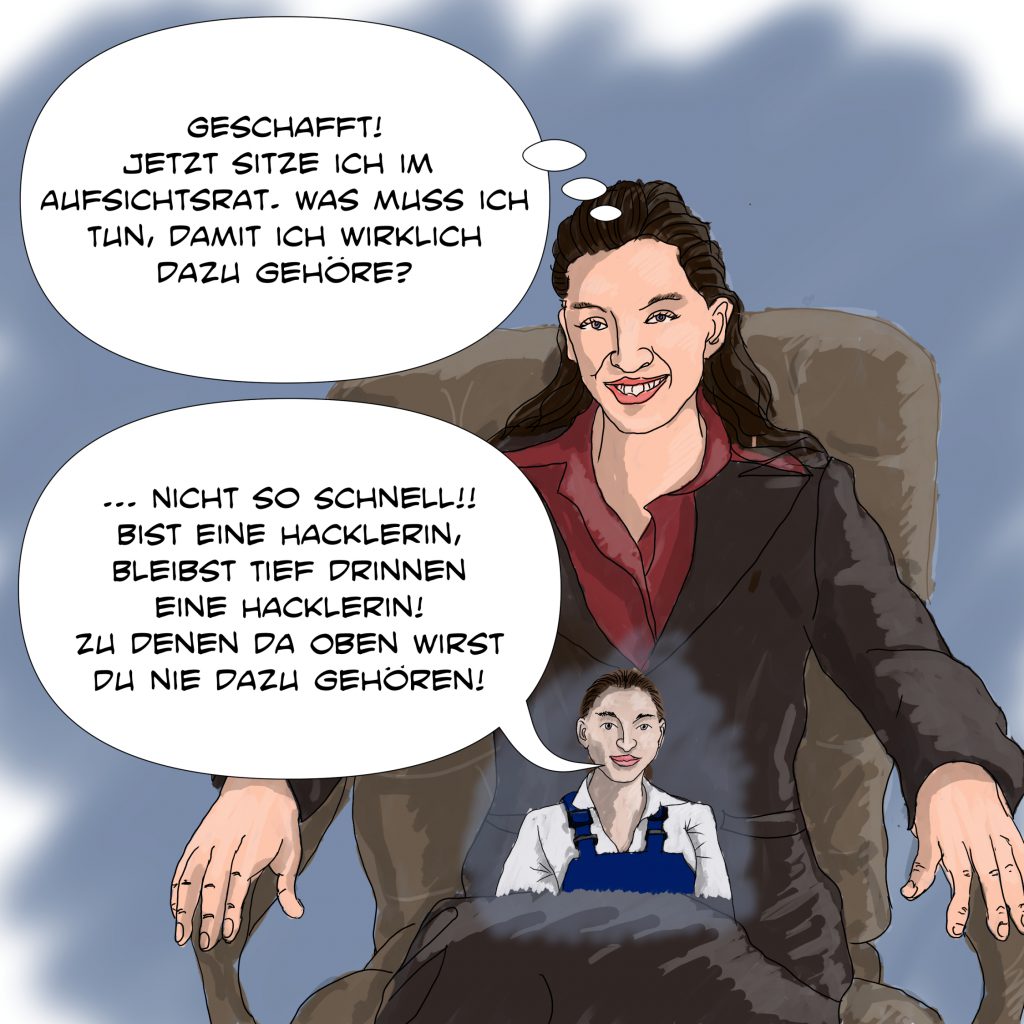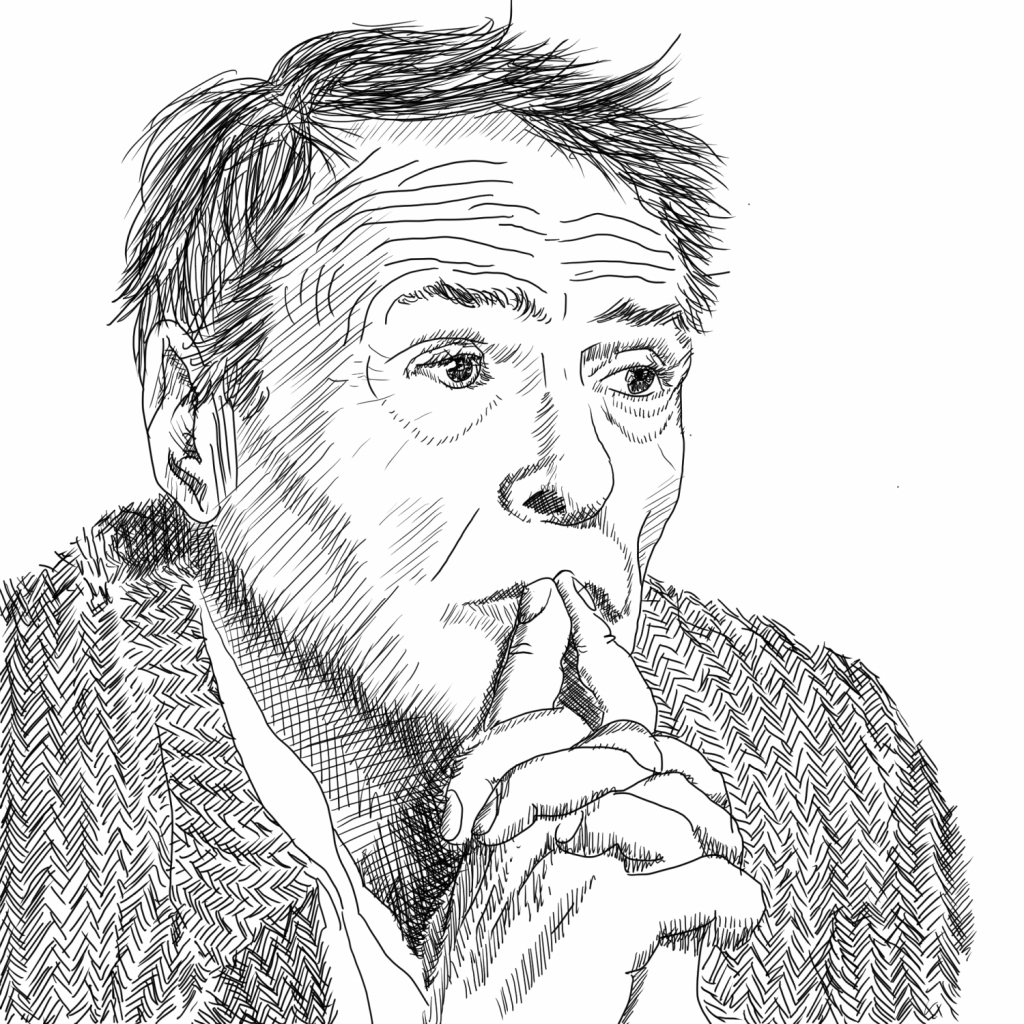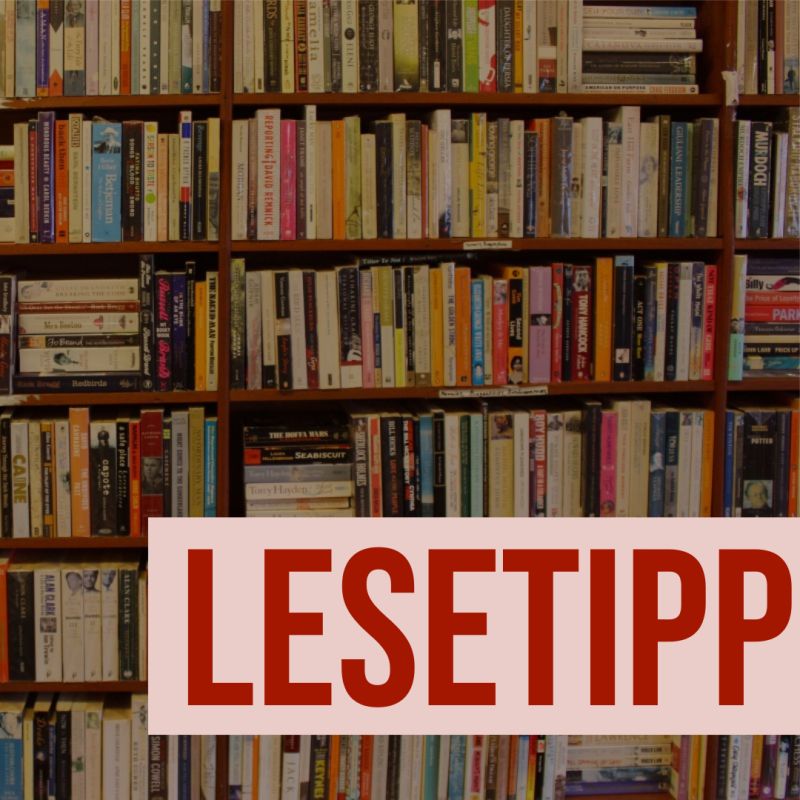Pierre Bourdieu – No power without capital or
Movement in „social space“ through trade union education
„Whether we sit or walk broad-legged, upright, head held high … or rather lowered-eyed, crouched, slumped … also reveals much about our positioning in social space, which is determined by the distribution of economic, cultural, social and symbolic capital.“
Quote from Rosa, 2017, 128
Wherever the trade union eye looks … intolerable inequality and unjust power relations. The French sociologist Pierre Bourdieu places the question of social inequality at the centre of his social theory. It is about the unequal distribution of power. He defines power as „the ability to dispose of resources in order to assert one’s own needs and interests“ (Koller, 2012, 139).
For Bourdieu, the „habitus“ inscribed in the body and the „capitals“ a person possesses have a lot to do with socialisation, with the possibilities of the family of origin – its positioning in „social space“. Habitus and capitals have a „limiting“ effect on our possibilities to take up a different position in the „social space“. Work and education offer the best chances to avoid being fatefully stuck in a certain, possibly underprivileged, social position, for example through formal further education and degrees.
In the context of this blog, the focus will be specifically on the role of trade union education in becoming capable of counter power, strengthening participants‘ capitals, stimulating their habitus towards „power-consciousness“ and thus increasing the „social energy“ (Bourdieu, 1992) for trade union struggles in „social space“.
Bourdieu’s terminology in fast forward
>Capital
Bourdieu distinguishes between four types of capital that a person possesses and that influence his or her position in the social space: economic, social, cultural and symbolic capital (cf. in the following Bourdieu, 1983, 183f).
- Economic capital: Those economic returns from our work that we do not immediately consume again, but save in the form of money or invest in „property“, which in turn remains convertible into money. This form of capital can, of course, also simply be inherited and thus influence our position in the social sphere without any contribution on our part (for example, Donald Trump, like many others, has – contrary to his own assertion – not earned everything himself).
- Social capital: We have at our disposal a personal network of varying degrees of permanence, „institutionalised relationships of mutual knowledge and recognition“. Social capital thus lives from the resource derived from „belonging to a group“. (Cf. Bourdieu, 1992, 63; Koller, 2012, 145). In our trainings we open up a broad field of social relations for our participants to each other and to the organisations of the workers‘ movement.
- Cultural capital: According to Bourdieu, it has three manifestations:
Incorporated cultural capital – it is virtually incorporated, part of our body and it is unconsciously simply present in the way we speak, which characteristics, knowledge and skills were „given“ to us in the course of our socialisation or which we have actively acquired ourselves.
Objectified cultural capital – this refers to cultural objects such as the book packages that our works council members take home from our training courses and keep in the works council office. This capital can be nicely seen in many expert interviews in front of bulging bookshelves.
Institutionalised cultural capital – at many of the final events of our courses, our graduates receive certificates. Such permanent institutional recognition of skills and abilities is the „stuff“ of this type of capital. Autodidacts who may be equally skilled in a field are at a disadvantage here. Precisely because we live in a society in which only degrees are usable. - Symbolic capital: Bourdieu distinguishes this fourth type of capital in order to emphasise that it has its own quality when certain other forms of capital receive special social recognition, such as educational titles.
>>Habitus
For Bourdieu, the human being is a socially shaped being. In the course of our lives, our „body“ stores individual and collective experiences; these shape our dispositions, attitudes, appearance, habits and ways of life. This „habitus“ shapes our patterns of perception, thought and action (cf. Schwingel, 1995, 54f). It acts as an unconscious image of ourselves, our social position and the possibilities for action that we perceive.

| Done! Now I’m on the board of directors. What do I have to do to really belong? … Not so fast! You are a worker, stay a worker deep inside! You will never belong to those up there! |
>>>Social space
The extent to which we possess the types of capital described above, their structure and weighting, and our social trajectory assign us a place in the „social space“ of our society. The lower our capital endowment, the less favourable our position in social space in relation to others. „So-called precarious lower classes, who have little social, economic and cultural capital, have less and less chance of social advancement, while conversely the privileged classes are de facto rarely threatened with relegation.“ (Rosa, 2017, 687)
Trade union education is meant to disrupt and irritate the order.
Trade union education is about building counter power. For this, it is not enough to only impart functional, preferably legal knowledge, but trade union education is the comprehensive task of systematically strengthening the „capitals“ of the addressees and irritating the communal habitus along current challenges.
Education offers the opportunity to become aware of one’s habitus and to analyse where it stands in the way of assertiveness. We are dealing with works council members who move in a „social space“ that has reproduced the rules of social partnership over decades. This has also given rise to a corresponding „habitus“. It sounds as if it was written more than ten years ago for the current counter power strategy project, which can be read in „Works Council Realities“: „… how does one deal with it when collective practice suddenly reaches the limits of its capacity to act? When the appropriated habitus reproduces a practice that gradually loses its effectiveness?“ (Becksteiner et al., 2010, 75f).
If „counter power“ is to become the focus of trade union education, then we have to pursue an „offensive strategy of expansive learning“ (cf. Becksteiner et al., 2010 73ff) in Holzkamp’s sense, i.e. we have to „unlearn“ the sole fixation on classical patterns of action by working out, practising and experiencing new problem-solving possibilities with our target groups that rely on power resources other than that of „social partnership“, i.e. an institutional power resource. Keywords here are organising, campaign strategies, a member and movement orientation.
If the interest opponent in the field no longer has anything to do with social partnership, then we have to unlearn the habitus of the conciliatory social partnership negotiator or even the habitus of the well-meaning supplicant for the interests of colleagues in favour of the habitus of the one who stands up power-consciously for fought-for and guaranteed rights. Trade union education is strengthening in a power-conscious habitus, for example with this: When we consciously work out power-strengthening social networks in the company in the seminar or in the retreat; analyse the very concrete sources of potential assertive power in the respective company; design strategies for small activating and participation-promoting issue struggles; train negotiation strategies and professional body language etc.
Trade union education as a driver of social mobility
Apart from the focus on counter-power, trade union education has another important function against Bourdieu’s theoretical background: to increase the extent to which we have the above-mentioned capitals at our disposal and thereby increase social mobility in the existing system. Especially in the case of long-term education – such as our works council academies, the social academy, the trade union schools and the project studies. The graduates leave with strengthened „capital“ resources (such as knowledge, personal social networks, cultural interests, certificates etc.) and a different appearance, and in some cases – according to their own perception – a more developed personality. Their habitus has developed further. Contributions to this are and can be:
- Appreciative forms of graduation and strong symbolic evidence and certificates;
- the classification of our offers in the National and European Qualification Frameworks;
- Framework programmes to broaden the cultural horizons of our addressees;
- contact opportunities with experts and important officials;
- the confrontation with demanding texts and the challenge of having to write one’s own texts in order to strengthen one’s ability to express oneself;
- in general – raising awareness of these capitals and their importance for social recognition and thus symbolic capital – as well as for „social energy“ with regard to struggles and confrontations in social space.
For further reading
- Becksteiner, Mario/ Steinklammer, Elisabeth/ Reiter, Florian (2010): BETRIEBSRATSREALITÄTEN – Betriebliche Durchsetzungsfähigkeit von Gewerkschaft und BetriebsrätInnen im Kontext der Globalisierung, Wien 2010; speziell die Seiten: 63ff; here a summary of the study.
- Bourdieu, Pierre: Die feinen Unterschiede. Kritik der gesellschaftlichen Urteilskraft, Frankfurt/Main 1987
- Bourdieu, Pierre: Ökonomisches, kulturelles und soziales Kapital, in: ders. Die verborgenen Mechanismen der Macht, Hamburg 1992, 49-75; also see here.
- Koller, Hans-Christoph: Grundbegriffe, Theorien und Methoden der Erziehungswissenschaft. Eine Einführung, Stuttgart, 2012, speziell 138-156
- Nestvogel, Renate: Pierre Bourdieu. Die verborgenen Mechanismen der Macht, read more here.
- Rosa, Hartmut: Resonanz. Eine Soziologie der Weltbeziehung, Berlin 2017; im Sinne einer kritischen Rezeption und Weiterentwicklung der bourdieuschen Konzeptionen der Kapitalformen und des Habitus.
- Schwingel, Markus: Bourdieu zur Einführung, Hamburg 1995
All the books listed above, as well as many others, can be ordered at the ÖGB Fachbuchhandlung.
For further viewing
- You can find an explanatory video on „Habitus“ here.
- Click here for an explanatory video on „Forms of capital“.
Author: Gerhard Gstöttner-Hofer
Lust auf mehr Theorie? Zu allen Beiträgen der Serie kommst du HIER!

Dieses Werk ist lizenziert unter einer Creative Commons Namensnennung-NichtKommerziell-Weitergabe unter gleichen Bedingungen unter gleichen Bedingungen 3.0 Österreich Lizenz.
Volltext der Lizenz

Dieses Werk ist lizenziert unter einer Creative Commons Namensnennung-NichtKommerziell-Weitergabe unter gleichen Bedingungen unter gleichen Bedingungen 3.0 Österreich Lizenz.
Volltext der Lizenz



